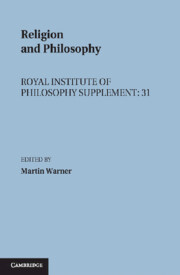Language, Interpretation and Worship
Published online by Cambridge University Press: 04 August 2010
Summary
Biblical Interpretation
‘There is a kind of eloquence’, maintained St Augustine,
which is manifestly inspired by God. Biblical writers have spoken with this kind of eloquence. … [On the other hand] they have uttered some passages with a beneficial and salutary obscurity (salubris obscuritas), to exercise and, in a sense, to polish the minds of their readers, to break down aversions and spur on the zeal of those who are anxious to learn, as well as to conceal the meaning from the minds of the impious. (Augustine 1947: IV.6.9; IV.8.22, with one amendment to the translation)
That noted Augustinian, Blaise Pascal, wrote of the Christian Revelation more tersely: ‘There is enough light for those who desire only to see, and enough darkness for those of a contrary disposition.’ (Pascal 1966: Pensée 149) The paradigm of sacred eloquence for Augustine is, of course, that of Christ, and there are echoes here of two Dominical sayings: one is the use of Isaiah vi 9–10 to account for the obscurity of the parables as devices to conceal (Matthew xiii 10–16; Mark iv 11–12; Luke viii 10; see also John xii 37–40); the other is the indication towards the end of the Johannine farewell discourses that so far ‘I have said these things (ταvτα) to you in figures’ (ἐν παϱοιµíαις; ‘in dark sayings’) though a time is coming when it will be be appropriate to ‘tell you plainly (παϱϱησíᾳ) of the Father’ (John xvi 25); here the obscurity can more properly be conceived of as ‘salutary’.
- Type
- Chapter
- Information
- Religion and Philosophy , pp. 91 - 122Publisher: Cambridge University PressPrint publication year: 1992



